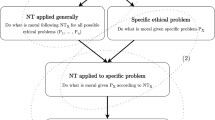Abstract
Jamie Dreier has argued that the supervenience of the moral on the non-moral requires explanation, and that attempts by the non-naturalist to provide it, or to sidestep the issue, have so far failed. These comments on Dreier first examine the notion of distinctness at work in the idea that non-natural properties are distinct from natural ones, pointing out that distinctness cannot be understood in modal terms if supervenience is to be respected. It then suggests that Dreier’s implicit commitment to the existence of infinite Boolean combinations of properties plays a significant role in the challenge to non-naturalism, and that the non-naturalist has some principled reasons for rejecting it. It also suggests that the real problem for non-naturalists isn’t explaining supervenience, but is rather the well-known problem of explaining our capacity to know anything about non-natural properties. That is, if the latter epistemological problem can be solved, the former metaphysical one might well disappear, at least as a distinctive problem for non-naturalist realists about morality.
Similar content being viewed by others
Notes
For discussion, see Enoch (2011), p. 137.
Especially since it is plausible that both of these properties are just the property of being a triangle. See Streumer (2008).
Schroeder (2005) might seem to offer an account on which the reals are reducible, since they can be analyzed in terms of rationals. But he also characterizes analysis in terms of closure, so he is in the same boat as Dreier.
Compare Wilson (2010), p. 627.
See Blackburn (1993), p. 158.
Compare Mabrito (2005), p. 304.
Compare Shafer-Landau (2003), p. 97.
Enoch (2011), p. 150 also notes that pushing on the supervenience worry can raise epistemological worries, but that they are distinct worries.
References
Blackburn, S. (1993). Essays in quasi-realism. Oxford: Oxford University Press.
Enoch, D. (2011). Taking morality seriously. Oxford: Oxford University Press.
Fitzpatrick, W. (2012). Ethical non-naturalism and normative properties. In M. Brady (Ed.), New waves in metaethics (pp. 7–35). London: MacMillan.
Mabrito, R. (2005). Does Shafer-Landau have a problem with supervenience? Philosophical Studies, 126(2), 297–311.
McGrath, S. (2018). Moral perception and its rivals. In A. Bergqvist & R. Cowan (Eds.), Evaluative perception (pp. 161–182). Oxford: Oxford University Press.
Ridge, M. (2007). Anti-reductionism and supervenience. Journal of Moral Philosophy, 4(3), 330–348.
Schroeder, M. (2005). Realism and reduction: The quest for robustness. Philosophers’ Imprint, 5(1), 1–18.
Shafer-Landau, R. (2003). Moral realism: A defence. Oxford: Oxford University Press.
Stoljar, D. (2007). The consequences of intentionalism. Erkenntnis, 66(1/2), 247–270.
Streumer, B. (2008). Are there irreducibly normative properties? Australasian Journal of Philosophy, 86(4), 537–561.
Wilson, J. (2010). What is Hume’s Dictum, and why believe it? Philosophy and Phenomenological Research, 80(3), 596–637.
Author information
Authors and Affiliations
Corresponding author
Additional information
Publisher's Note
Springer Nature remains neutral with regard to jurisdictional claims in published maps and institutional affiliations.
Rights and permissions
About this article
Cite this article
Gert, J. Moral supervenience and distinctness: comments on Dreier. Philos Stud 176, 1409–1416 (2019). https://doi.org/10.1007/s11098-019-01245-9
Published:
Issue Date:
DOI: https://doi.org/10.1007/s11098-019-01245-9



